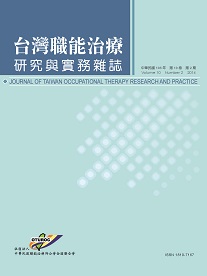Journal of Taiwan Occupational Therapy Research and Practice

半年刊,正常發行
現今早期療育開始關注親子互動與親子關係對於兒童行為表現的重要性,研究發現母 親回應兒童的方式和兒童社會行為表現有關聯,而兒童的行為問題也會引發父母負向的親 職行為與憂鬱的情緒,兒童的行為問題和父母不適當的親職行為可能會相互作用造成親子 關係的瓦解。親子關係對於兒童的心理社會發展和父母的安適感來說都是很重要的議題, 故本文介紹親子關係雙向模式,藉由統整過去文獻來瞭解影響親子關係的因子,此外,本 文也將介紹目前用於促進親子關係的實證研究,並提供臨床應用供讀者參考。文獻彙整結 果發現,影響親子關係的因子包含孩童行為問題、孩童年紀、父母親的親職教養技巧、父 母親的心理健康狀態、父母親的人口學因子、父母親的社會支持度與親子所處的環境,這 些因子皆會交互作用,影響親子關係。目前已有學者提出幾種透過改變親職技巧以建立良 好的親子關係並改善孩童社會行為的治療模式,如:親子互動治療、父母為媒介的溝通治 療與地板治療等。實證研究結果支持當親子關係獲得改善時,亦能減少孩童的行為問題, 且能提昇孩童人際互動的能力。因此作者建議職能治療師在處理孩童的問題時,除了評估 個案本身的能力之外,也應觀察孩童與父母的互動情形,並教導家長合宜的互動模式,當 親子關係穩定且溫暖時,將有助於孩童表現出適宜的社會行為。
Eearly intervention starts to focus on the essential role of the parent-child relationshipsin children’s social behavior. Previous studies have found the signi cant correlations between maternal responsiveness and children’s social behavior as well as parents’ parenting skills, responsiveness and depressions and children’s problematic behaviors. Thus, this articleaims to introduce the bi-directional model of parent-child relationships first and to identifythe relevant in uential factors. The results show children’s problematic behaviors and ages, parents’ parenting behaviors and mental health, parental demographic characteristics and eco-social status, and the context are mutually affecting the parent-child relationships. In addition, empirical studies support the effectiveness of parent-child relationship trainings (e.g. parent-child interaction therapy, parent-mediated communication-focused treatment and oor time). Therefore, it is suggested that when occupational therapists deal with the child’s behavioralissues, they should also access the parent-child relationships and provide appropriate education for the parents. While the parent-child relationship is stable and moderate, it helps children to have better social performance.












